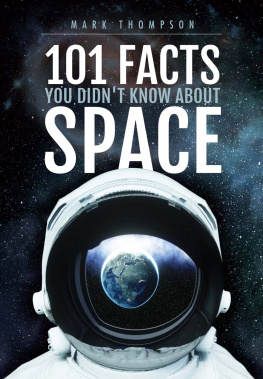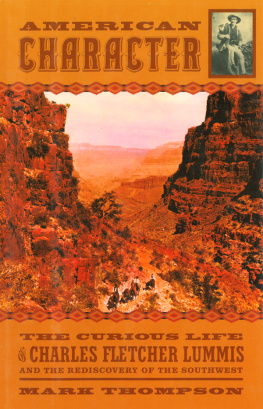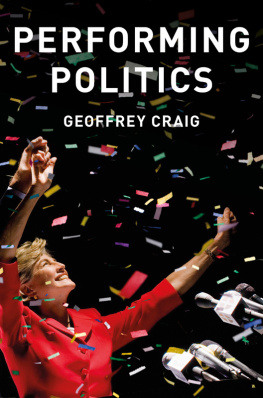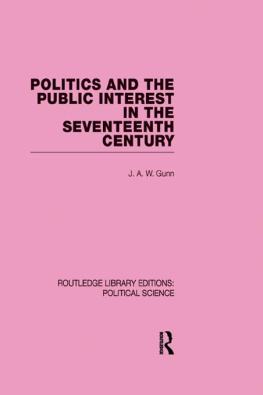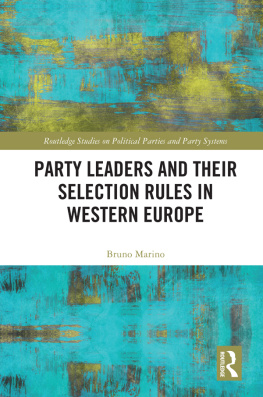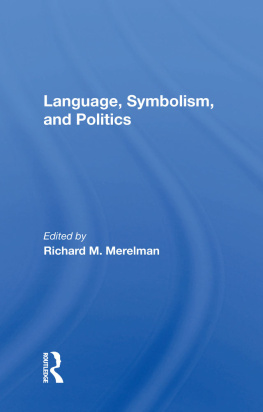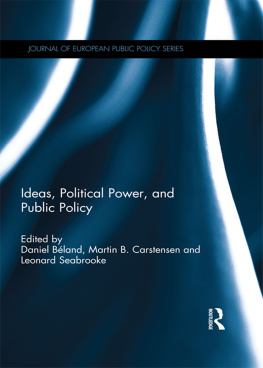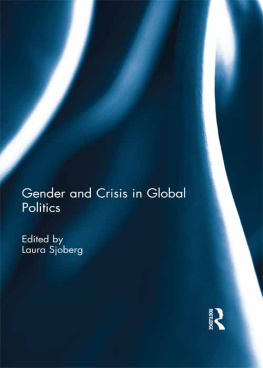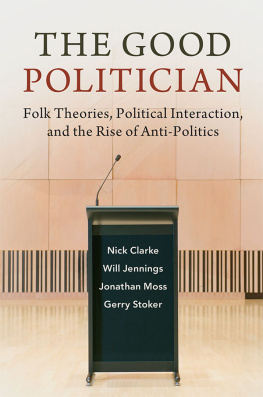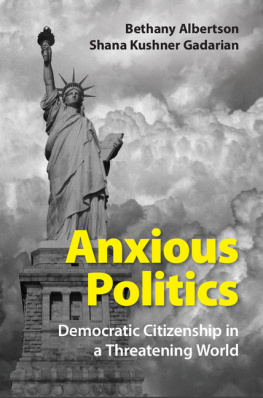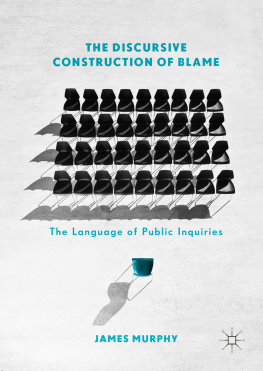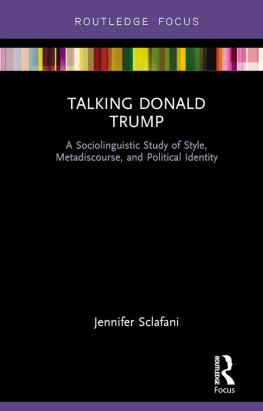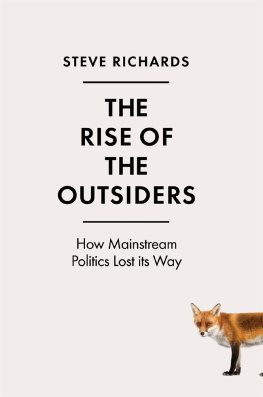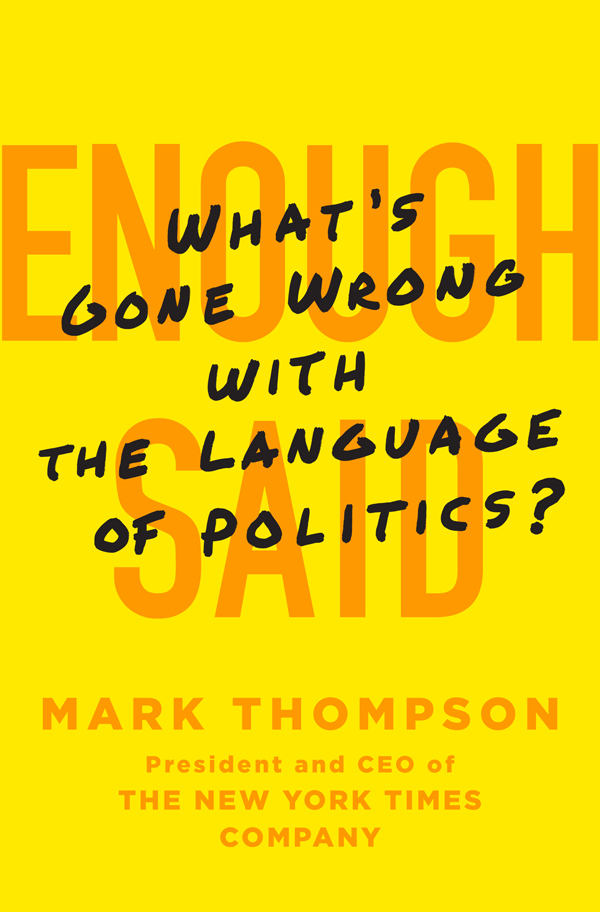Contents
Guide

The author and publisher have provided this e-book to you for your personal use only. You may not make this e-book publicly available in any way. Copyright infringement is against the law. If you believe the copy of this e-book you are reading infringes on the authors copyright, please notify the publisher at: us.macmillanusa.com/piracy.
For Jane
Dont Retreat, InsteadRELOAD!
SARAH L. PALIN
Public language matters. Words are free, and every politician and journalist and citizen can draw on an unlimited supply of them. But there are days when the right words are all that count, and it is the speaker who can find them who determines what happens next. Over time, leaders and commentators and activists with empathy and eloquence can use words not just to exploit the public mood but to shape it. And the result? Peace, prosperity, progress, inequality, prejudice, persecution, war. Public language matters.
This is hardly a new discovery. Its why public language and public speaking have been studied and taught and fought over for thousands of years. But never before has public language been as widely and readily distributed as it is today. Words hurtle through virtual space with infinitesimal delay. A politician can plant an idea in ten million other minds before she leaves the podium. An image with an author and a deliberately composed meaninga plane hitting a skyscraper, saycan reach the eyes of viewers around the world with an instantaneity unconstrained by distance or mechanical limit. Once, and not long ago in human history, we would have heard a rumor, or read a report of it, days or even weeks later. Today we are all witnesses, all members of a crowd that is watching and listening in real time.
Now. Its happening now. Hes saying that now. Youre posting this now. Im replying now. Listen to me. Look at me. Now.
We think of ours as the age of digital information, and so it is. But we sometimes forget how much of that information is conveyed in human language that is doing what it has always done in human societies: alerting, frightening, explaining, deceiving, infuriating, inspiring, above all persuading.
So this is also the age of public language. More than that, we are living through an unparalleled, still unfolding and uncertain transformation of public language. But when we consider and debate the state of modern politics and mediahow policies and values get discussed and decisions get madewe tend to think of it only in passing, as if it is of interest only insofar as it can help us understand something else, something more foundational. It is the argument of this book that public languagethe language we use when we discuss politics and policy, or make our case in court, or try to persuade anyone of anything in a public contextis itself worthy of close attention. Rhetoric, the study of the theory and practice of public language, was once considered the queen of the humanities. Now she lives out her days in genteel obscurity. Im going to make the case for putting her back on the throne.
We enjoy one advantage over earlier generations of students of rhetoric. Thanks to the searchability and indelibility of modern media, it has never been easier to trace the evolution of the specific words and statements of which a particular oratory is constituted. Like epidemiologists on the trail of a new virus, we can reverse time and track an influential piece of public language from its pandemic phase, when it was on every lip and every screen, back through its late and then its early development, until we arrive at last at the singularity: the precise time and place it first entered the world.
* * *
On July 16, 2009, Betsy McCaughey, the former lieutenant governor of New York, appeared on Fred Thompsons radio show to add her two cents to the hottest political topic of that summerPresident Barack Obamas controversial plans to reform Americas health-care system and extend coverage to tens of millions of uninsured citizens.
Fred Thompson was a colorful conservative whose furrowed and jowly gravitas had taken him from a successful law career to the US Senate, not to mention several successful stints as a Hollywood character actor. After the Senate, he embraced talk radio, and in 2009 his show was one of countless conservative outlets on which Obamacare was dissected and condemned.
There wasnt a better person than Betsy McCaughey to do that. A historian with a PhD from Columbia (thus entitling her to that medical-sounding Dr.), McCaughey had risen through sheer brainpower from humble origins in Pittsburgh to become a significant public figure on the American Right. And she was considered a specialist in health-care policy. She had been a forensic as well as ferocious critic of Clintoncare, the Democrats failed attempt to reform the system in the 1990s. Obamacare, of course, was a rather different propositionindeed, some of its founding principles had been developed by Republicans, or even implemented by them. The policy bore a particularly inconvenient resemblance to Mitt Romneys health-care reforms while he was governor of Massachusetts. Mr. Romney was already being touted as a possible challenger to Barack Obama in the 2012 presidential election.
But Betsy McCaughey was too forthright and ideologically committed to be discomforted by the intellectual genealogy of Obamacare. Nor was she likely to face a particularly testing cross-examination from her lawyer-turned-radio-host. American politics was polarizing even before Barack Obama arrived in the White House, and the media discussion of that politics had polarized along with it. The paradoxical result was that the more bitter the divisions became, the more likely it was that everyone in any given studio or on any political Web site would agree with one another. The people with whom they all disagreed were absentindeed were probably all gathered in a different studio, making the opposite case in an equally cozy ideological cocoon where they faced the same low risk of contradiction.
On the face of it, then, nothing about this encounterthe political circumstance, the characters, the likely flavor and flow of the argumentwas out of the ordinary. But on July 16, Betsy McCaughey had something new to say. Deep within one of the drafts of the Obamacare legislation that was then making its way through Congress, she had stumbled on an unnoticed but alarming proposal:
One of the most shocking things I found in this bill, and there were many, is on page 425, where the Congress would make it mandatory that every five years, people in Medicare have a required counseling session that will tell them how to end their life sooner, how to decline nutrition, how to decline being hydrated, how to go into hospice care These are such sacred issues of life and death. Government should have nothing to do with this.
There are two things to note about this claim. The first is simply that its untrue. The section of the bill that McCaughey was referring toSection 1233did not in fact call for compulsory end-of-life counseling sessions. Such sessions would have remained at the patients discretion. The intent of the draft section was to make these voluntary sessions eligible for coverage under Medicare, the federal program that pays many of older Americans medical costs.
But the fact that it was untrueand indeed was promptly and definitively refuted by defenders of the billdid nothing to stop it from rapidly gaining currency. This is the second, and more intriguing, point to note. Provision of end-of-life counseling had previously enjoyed tentative bipartisan support, but in the days following McCaugheys appearance, many of Americas most influential conservative commentators and a number of prominent Republican politicians, including the House minority leader, John Boehner, took up her charges. And the claim began to be rounded out. The radio host Laura Ingraham cited her eighty-three-year-old father, proclaiming, I do not want any government bureaucrat telling him what kind of treatment he should consider to be a good citizen. Thats frightening.most of the discussion on the conservative side of the political divide was predicated on the assumption that McCaugheys claim about the bill was a straightforward statement of fact.



